young men
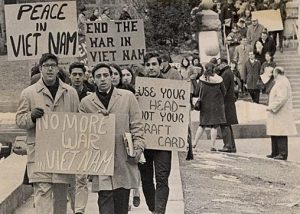 Registering for the draft is a requirement when a young man reaches 18 years of age. There is no draft in the United States anymore, but by registering the young men, the government could hold a draft, should a war bring such a need. During the Vietnam War, there were a lot of people who felt that the United States shouldn’t be in the war. Many young men didn’t want any part of it, and they decided to protest the war by burning their draft cards. Of course, this was forbidden by law, but they didn’t care. They were willing to take the chance, if it meant that they could avoid going to war.
Registering for the draft is a requirement when a young man reaches 18 years of age. There is no draft in the United States anymore, but by registering the young men, the government could hold a draft, should a war bring such a need. During the Vietnam War, there were a lot of people who felt that the United States shouldn’t be in the war. Many young men didn’t want any part of it, and they decided to protest the war by burning their draft cards. Of course, this was forbidden by law, but they didn’t care. They were willing to take the chance, if it meant that they could avoid going to war.
By May 1965 young men were protesting by burning their draft cards with greater frequency around the United States. To limit this kind of protest…in August 1965 the United States Congress enacted a law to broaden draft card violations to punish anyone who “knowingly destroys, knowingly mutilates” his draft card. Then, on October 15, 1965, in New York, David Miller, a young Catholic pacifist, became the first US war protestor to burn his draft card at a protest rally, in direct violation of a recently passed law forbidding such acts. Agents from the Federal Bureau of Investigation later arrested him. He was tried, found guilty, and sentenced to two years imprisonment, but that did not stop the protesting or the burning of draft cards. Subsequently, 46 men were indicted for burning their draft cards at various rallies, and four major court cases were heard. One of them, United States v. O’Brien, was argued before the Supreme Court. The act of draft card burning was defended as a symbolic form of free speech, a constitutional right guaranteed by the First Amendment. The Supreme Court decided against the draft card burners. It determined that the federal law was justified and that it was unrelated to the freedom of speech. This outcome was criticized by legal experts.
From 1965 to 1973, few men in the United States were convicted of burning their draft cards, and some 25,000 went unpunished. I suppose it was difficult to wrap our minds around the idea imprisonment for our young men over a protest. Still, it was illegal. And something had to be done. Before 1965, the act of burning a draft card was already prohibited by US statute and the registrant was required to carry the card at all times. Any destruction of the card was against the law. Also, it was entirely possible for a young man to destroy his draft card and still answer the call to service by appearing at an induction center and serving in the military. It also seems to me that if they had registered, that the government also had a copy of the registration, so if they were going to be drafted, having or not having the card was really a formality. And it was possible for a registrant to faithfully keep his card on his person but fail to appear when called. The draft 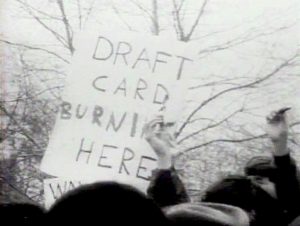 card burning was an act of protest against the war, more than it was a way to avoid the draft. Still, the image of draft card burning was powerful, and very influential in American politics and culture. Photos appeared in magazines, newspapers and on television. It was proof of a political divide between those who backed the United States government and its military goals and those who were against any United States involvement in Vietnam. With the political upheaval, Richard Nixon ran for president in 1968 on a platform based largely on putting an end to the draft, hoping to put an end to protesters burning their cards. As president, Nixon indeed did end the draft in 1973, rendering the symbolic act of draft card burning unnecessary, and registering just a requirement.
card burning was an act of protest against the war, more than it was a way to avoid the draft. Still, the image of draft card burning was powerful, and very influential in American politics and culture. Photos appeared in magazines, newspapers and on television. It was proof of a political divide between those who backed the United States government and its military goals and those who were against any United States involvement in Vietnam. With the political upheaval, Richard Nixon ran for president in 1968 on a platform based largely on putting an end to the draft, hoping to put an end to protesters burning their cards. As president, Nixon indeed did end the draft in 1973, rendering the symbolic act of draft card burning unnecessary, and registering just a requirement.
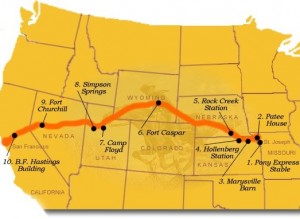 I often wonder how it must have felt to live in a time when so many things were changing in ways that man had not seen before. Things like the automobile, the airplane, the light bulb, the telephone, and the telegraph, all came into being between the 1800s and the early 1900s. Prior to these things, our world was rather primitive concerning things like travel, communication, and even the home life…at least by today’s standards, anyway.
I often wonder how it must have felt to live in a time when so many things were changing in ways that man had not seen before. Things like the automobile, the airplane, the light bulb, the telephone, and the telegraph, all came into being between the 1800s and the early 1900s. Prior to these things, our world was rather primitive concerning things like travel, communication, and even the home life…at least by today’s standards, anyway.
When families began moving West to find land and adventure, it was often a very sad time, because many of these people would not see their loved ones again. They might not even hear from them. This really seemed like an unacceptable situation for most of the people on both sides of that spectrum. The people needed to hear from their loved ones, and so like every other idea, from necessity came a solution…the Pony Express. Prior to the Pony Express, people might try to send a letter with a wagon train heading West to see of they could manage 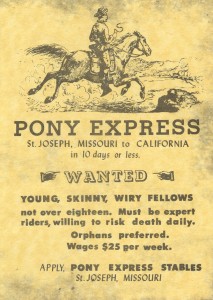 to get it to a loved one who had left a year or more before. Imagine the impossibility of that feat. The person with whom the letter was sent, might not even know the person to whom the letter was being sent. It meant asking around in the area they had planned to settle in, and if they had moved elsewhere…well that is the real definition of the dead letter.
to get it to a loved one who had left a year or more before. Imagine the impossibility of that feat. The person with whom the letter was sent, might not even know the person to whom the letter was being sent. It meant asking around in the area they had planned to settle in, and if they had moved elsewhere…well that is the real definition of the dead letter.
The Pony Express became the first dedicated postal service ever, on this day, April 3, 1860, but it was a far cry from the mail service of today, about which many of us complain. The men who chose to be Pony Express riders had to be told about what they might be riding into. There were Indians, who did not like the White Man. Treaties had been broken, and the White Man was considered an intruder on Indian land. To say that the White Man was not welcome in the West, was putting it mildly. Every time the Pony Express rider set out, he was taking on the risk of never coming back. The Help Wanted posters clearly stated the dangers, and the riders had to be single young men preferably under eighteen and preferably orphans!! Not a glowing help wanted ad, for sure, still there was a need, and these brave men took the challenge and made it work. The Pony Express was a short lived phenomenon, however, lasting just eighteen short months. I suppose something had to be done to make mailing a letter safer. At the point when the last Pony Express rider rode his route, the telegraph had somewhat 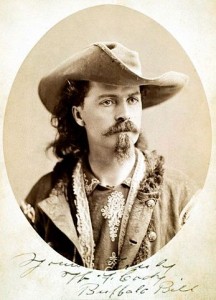 taken its place. Most what had been needed was to be able to let people about the death of loved ones and other urgent or important news, so it seemed like an unnecessary risk to place on these men, when a safe way had been found.
taken its place. Most what had been needed was to be able to let people about the death of loved ones and other urgent or important news, so it seemed like an unnecessary risk to place on these men, when a safe way had been found.
The first Pony Express rider to make the run has been a matter of dispute, but historians have narrowed it down to Johnny Fry or Billy Richardson. James Randall was credited with being the first Eastbound rider, heading out from San Francisco to Sacramento, and William (Sam) Hamilton took the mail from there to the Sportsman Hall Station, where he handed it off to Warren Upson. Other riders were Gus and Charles Cliff, Robert Haslam, Jack Keetley, Billy Tate, and the famous William Cody, known to most of us as Buffalo Bill. Together, these men rode into history as some of the bravest men who ever lived. Riding alone through dangerous territory, risking their lives to make life a little easier for the ever expanding nation we lived in.
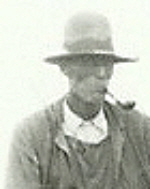 When I think about our organized military system, both during the years of the draft and now with our military being voluntary service, it occurs to me just how fortunate we, as a people, are to live where we do. There are so any evil leaders in countries who are not only enemies to the rest of the world, but in reality, enemies to their own people. In those countries, the military forces are not only not voluntary and not draft either, but rather they are forced into service, and often taken forcibly from their homes in the middle of the night, never to be seen again. Those taken are often children…even very young children, who are taken from their families and trained to be soldiers, or rather, trained killers. Their lives are viewed as unimportant. They are simply there to do the bidding of their evil government, and die doing it if necessary. They are expendable, because to replace them, the government simply goes out in the middle of the night and takes another child from another family by force. This was the position my great great grandfather, Stephan Beier found himself, his wife, Anna Maria Meier Beier, and their family in, one night in Russia. It was the reason that his family left Russia, and it was the reason my grandfather, Cornealius Byer was in the United States when he met my great great grandmother, Edna Fishburn in the Dakota Territory in the mid 1880’s.
When I think about our organized military system, both during the years of the draft and now with our military being voluntary service, it occurs to me just how fortunate we, as a people, are to live where we do. There are so any evil leaders in countries who are not only enemies to the rest of the world, but in reality, enemies to their own people. In those countries, the military forces are not only not voluntary and not draft either, but rather they are forced into service, and often taken forcibly from their homes in the middle of the night, never to be seen again. Those taken are often children…even very young children, who are taken from their families and trained to be soldiers, or rather, trained killers. Their lives are viewed as unimportant. They are simply there to do the bidding of their evil government, and die doing it if necessary. They are expendable, because to replace them, the government simply goes out in the middle of the night and takes another child from another family by force. This was the position my great great grandfather, Stephan Beier found himself, his wife, Anna Maria Meier Beier, and their family in, one night in Russia. It was the reason that his family left Russia, and it was the reason my grandfather, Cornealius Byer was in the United States when he met my great great grandmother, Edna Fishburn in the Dakota Territory in the mid 1880’s.
The family had been asleep and suddenly, they were awakened to the most horrifying event any family could ever imagine. Their son was taken at gun point, by soldiers. It was the Russian draft of the day. They did not care what his age was, nor did they care about any other qualifications, or the lack thereof. They needed more soldiers, and he had been chosen. I’m sure they had watched him for some time, along with watching many other young men his age. I don’t know how old he was at the time, but I do know that he was probably not out of school yet. What I do know is that my great great grandparents never saw their son again. My guess is that he probably lost his life in a battle somewhere within a year. The Russian leaders did not care about the soldiers…they were expendable…a dime a dozen, so their safety was unimportant. They were most likely sent into the worst battle zones, to fight the most likely to be lost battles. In that way, they government could keep their best officers and soldiers, the ones who had chosen to be there…if that was possible, safer from the worst battles. Or maybe, they put all the soldiers in the same harm’s way.
My great great grandparents were very distraught at the events of that night and they knew that they were not going to go through it again. The decision was made to secretly make their way out of Russia and go to the United States where their children could grow up safely, and if they were drafted into military service, they would be treated with dignity, and they would be able to stay in touch with their families. No parent is completely comfortable with their child going into military service, because if there is a war, their child will be in the middle of it. Nevertheless, they are proud of their child’s service…when it is done in the right way. To come into their home in the middle of the night, and forcibly take their child, knowing that they will never hear from that child again, is simply and horribly wrong. My great great grandparents decided that they were never going to go through it again. That is what made their decision to immigrate to the United States a move that was much less scary that the thought of staying in Russia. They never knew what happened to their son, and I’m certain that was something that stayed with them all their lives, but they knew they had done the right thing when they saw the rest of their family grow up and lead good lives in the United States.

